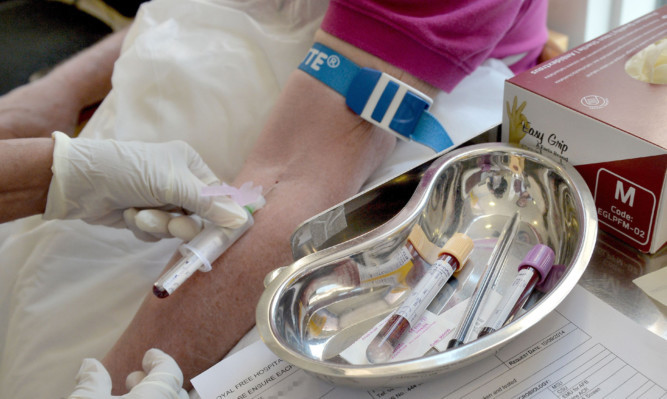Research by a junior doctor at Ninewells Hospital and Perth Royal Infirmary has highlighted the cost of unnecessary blood tests.
Undertaken in the trauma and orthopaedic units in Tayside, research has shown as many as 65% of blood tests are redundant.
The data was presented to the Audit Symposium during the Royal College of Surgeons of Edinburgh annual president’s meeting, and revealed that the NHS could be wasting thousands of pounds every day.
Ninewells junior doctor Alastair Faulkner evaluated hundreds of frequently-requested blood investigations for acute patients, and discovered that lack of official guidance, fear of litigation and getting into trouble from superiors led to many pointless and expensive blood tests being taken.
Dr Faulkner said: “As a junior doctor, I noticed that blood tests were being requested with little indication as to why they were needed.
“Blood investigations are costly not to mention unpleasant for patients and often contain very little in terms of clinical significance.
“Our study highlighted the need for clear guidance; for example, once we had implemented controls the total number of liver function tests (LFTs) alone requested dropped by a staggering 65%.
“This was not at detriment to the patient, in fact, out of the 895 LFTs requested in January, just four patients had a previous history of documented liver disease.”
Royal College of Surgeons of Edinburgh president Mr Ian Ritchie, who is a consultant trauma and orthopaedic surgeon, said: “Junior doctors and surgical trainees are at the very coalface of healthcare delivery and as such are uniquely placed to reveal opportunities for improvement.
“This study is a great example of the power of several disciplines coming together to implement changes that benefit patients and the Health Service as a whole.
“Research such as this, presented at our Audit Symposium, alongside pro-active collaboration between different specialties should be taking place across all of Britain’s hospitals.”
Researchers Dr Faulkner and surgeon Mike Reidy, working with surgical, anaesthetic and blood science teams, subsequently drew up guidelines resulting in a dramatic reduction in the number of requests (1,040 to 840), with overall costs in their department slashed by a third (33.3%) in just one month.
NHS Tayside medical director Dr Andrew Russell said: “I welcome the findings of this study which highlights the important role that junior doctors play across the NHS.
“It is important that tests carried out across NHS Tayside are appropriate and clinically necessary for each patient.
“Minimising waste, variation and harm is at the core of all the improvement work we undertake in NHS Tayside and this study will help inform our ongoing work to enhance patient care.”
